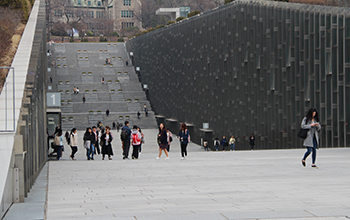
In response to the threat of North Korea’s nuclear weapon, the installment of Terminal High Altitude Area Defense (THAAD), a missile defense system, was raised as a possible defense solution. Following a fierce debate on its pros and cons, on July 13, 2016, Korea and the U.S. military authorities revealed their plans for the installment of THAAD.
The decision has provoked a number of economic sanctions from China, such as restricting Lotte’s business on the mainland and banning tourist travels to Korea. This has caused a noticable decrease in Chinese tourists at many tourist attractions. The sanctions have also affected university campuses. The current number of international students in Korea is about 113,000, with Chinese students making up approximately 60 percent. After the THAAD installment was determined, the number of Chinese students studying in Korea has decreased from 66,614 in 2016 to 65,386 in January 2017, according to statistics from the Ministry of Justice. Universities view this phenomenon as a result of an unofficial restriction by the Chinese government.
Limitations on academic exchange is another problem expected in universities. A joint project of the Institute of Chinese Studies of Hanyang University and Beijing University, which was being carried out without problems, was cancelled by Beijing University on March 7 in a single-handed notification to abandon the project. This action was unprecedented as these two universities have gone through numerous joint projects, and this was the first time the project was terminated by a unilateral notification. It was said that Beijing University did not explicitly mention THAAD as the reason for the abrupt halt, but Hanyang University suspects it to be one of the main reasons.
However, the impact of the sanction has not yet brought any noticeable effect on the academic exchanges between Korea and China. Not many cases of Chinese students giving up their studies in Korea or canceling their admission to Korean universities have been reported so far. Some suspect that the relative stability of Chinese students studying in Korea is due to the difference in academic calendars between the two countries. China begins its new school year in September, whereas Korea begins in March. Moreover, the admission results were already confirmed a few months before the sanctions began, making it difficult for the admissions to be cancelled.
A Chinese student studying in Ewha Womans University expressed her view on this issue.
“I personally did not think that political affairs would greatly influence students’ choice of a country or a region for further studying,” said Wang Han-xuan, a freshman in the Division of International Studies. “I did hear of some people reconsidering their decisions because of tensions between Korea and China. But I have not seen any Chinese students going back to China due to this matter so far. I do not think there will be any immediate military conflict that will interfere with our studies.”
In addition to her view, she hoped the two countries would resolve the current problem.
“As an overseas Chinese student in Korea, I hope a soon-to-be formed Korean administration will handle the severely impaired ties with China wisely and cope with the entangling security challenges brought to maintain peace in the Northeast Asian region,” added Wang.

